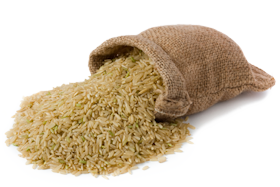|
Brown rice is
packed with fibre. In fat, it has a higher fibre content than white rice. Fibre
gives it a high satiety value which helps in keeping you full for longer and
therefore brown rice is a great alternative for those who are trying to manage
their weight.
Brown rice
also has a low glycaemic index (the rate at which the body absorbs sugars). It
releases sugar slowly and takes longer to digest. This way it helps in
regulating the metabolism and maintaining steady blood sugar levels. Studies
have shown that brown rice helps in reducing the risk of type-2 diabetes.
Processed rice has a higher glycaemic index.
Brown rice
is also a great source of manganese which makes it heart-friendly. Manganese
helps in maintaining healthy cholesterol levels. After the milling process,
rice loses almost half of its manganese content. Brown rice also contains
various essential natural oils that may be lost on processing it.
Diabetes: Brown rice is beneficial for diabetic and hyperglycaemic
individuals. It has a low glycaemic index which is helpful in reducing insulin
surges and assists in the stabilization of blood sugar levels in the body. A
comparative study conducted in this regard has revealed that it is rich in
phytic acid, fibre, and essential polyphenols. It is a complex carbohydrate
which helps in slower release of sugars as compared to white rice. American
diabetes association also recommends choosing nutrient-dense brown rice over
white rice for diabetics in order to accomplish the need of essential vitamins,
fibre and minerals in their diet.
Antioxidant
activity: Brown rice is rich in powerful antioxidants
which extend their protection against the damage caused by oxygen free
radicals. It contains an important antioxidant enzyme called superoxide
dismutase which protects the cells from oxidation damage during energy
production. A comparative study involving white and brown rice has suggested
that brown rice exhibits superior radical scavenging activity and aids in the
prevention of various oxidation-mediated diseases such as coronary heart
diseases.
Obesity: Brown rice is instrumental in seeking weight control for the
people combating with obesity. It contains manganese which helps to synthesize
the body fats. A research study conducted in this regard has revealed that
consumption of whole grains such as brown rice has positive effects on the body
with respect to reduction in body mass index and body fat. It also enhances the
activity of glutathione peroxidase, an antioxidant enzyme and helps elevate the
levels of HDL cholesterol in the obese individuals. Another comparative
research has also advocated the anti-obesity effects of germinated brown rice.
Neurodegenerative
disorders: Germinated brown rice helps in the prevention
of neurodegenerative complications such as Alzheimer’s disease attributing to
the abundance of gama-aminobutyric acid. Sprouted brown rice contains healthful
components which helps in the inhibition of harmful enzyme called
protylendopetidase which is associated with Alzheimer’s disease. It is also beneficial
for other cerebral-related disorders such as dementia and amnesia.
Psychosomatic health
for lactating women: Sprouted brown rice is beneficial
for the mental health of the lactating mothers.
An investigative study has shown positive results in the nursing women
with respect to reduction in mood disturbances, stages of depression and
fatigue. It has also suggested that
consumption of brown rice during lactation enhances body’s ability to resist
stress and improves overall immune defence.
Digestive health: Brown rice is healthful staple which can be added to the daily
diet for keeping a healthy digestive system. Fibre present in helps regulate
the bowel function and keeps a fuller feeling. A comparative study
investigating the effects of white rice and brown rice during gastric digestion
has made it qualitatively evident that the bran layer on brown rice prevents
the absorption of acid and humidity resulting in better texture retention.
Fibre content also brings relief from other troubling conditions such as
constipation and colitis.
Cardiovascular
health: Brown rice is rich in selenium which is beneficial for a healthy
heart. Consumption of whole grains such as brown rice helps reduce the blockage
of arteries due to plaque build up. This protective action is contributory in
the reducing the risk of cardiac disorders such as high hypertension and
vascular diseases. Studies conducted in this regard have suggested that the
tissue surrounding the grain of brown rice contains a healthful component which
acts against the endocrine protein angiotensin II, implicated in the
development of high blood pressure and atherosclerosis or hardening of
arteries.
Healthy levels of
cholesterol: Brown rice is a healthy option for
maintaining healthy levels of cholesterol attributing to the presence of
naturally occurring oils. An investigative study has revealed that it possess hypocholesterolaemia
qualities and regulates cholesterol catabolism. It contains beneficial
nutrients that help in lipid and glucose metabolism. Another study conducted
has revealed that consumption of brown rice has shown significant improvement
in the serum and HDL cholesterol concentrations in the subjects with chronic
ethanol abuse. It has also suggested germinated brown rice extract helps in preventing
the rise in the liver triglycerides due to excessive alcohol intake attributing
to the presence of gamma-aminobutyric acid.
Cancer: Brown rice is helpful in the prevention of various cancers
such as colon cancer, breast cancer and leukaemia. This beneficial effect can
be attributed to the presence of potent antioxidants and high fibre content in
it. The fibre content present in brown rice has the ability to bind itself to
the harmful cancer causing toxins in the body. This prevents the toxins from attaching
to the walls of the colon and helps eliminate them from the body. An
investigative study evaluating the chemopreventive properties of brown rice has
validated that its bran contains essential phenols such as tricin, ferulic
acid, caffeic acid which is present at much lower levels in white rice. These
phenolic components are valuable in the inhibiting the proliferation of colon
and breast cancer cells. Another study has revealed the stimulatory effect of
germinated brown rice on the induction of apoptosis and its inhibitory effects
on the production of leukaemia cancer cells. Furthermore, researches have
validated the antitumor effects of dietary brown rice brans.
Brain & Nervous
system: Brown rice is beneficial for the smooth functioning of the brain
and nervous system. It helps in accelerating the metabolism in the brain
attributing to the presence of vitamin B and essential minerals such as
manganese. Magnesium present in it balances the activity of calcium in the body
and helps in the regulation of nerves and muscle tone. It prevents the sudden
surge of calcium into the nerve cells and activation of nerve. This aid in
keeping the nerves and muscles relaxed and prevent excessive contraction.
Vitamin E present in it also plays a vital role in preventing various brain
diseases caused due to oxidative damage.
Anti-depressant
properties: Germinated brown rice possesses
anti-depressant qualities and helps in combating anxiety related disorders. An
investigative study has suggested that germinated brown rice contains essential
amino acids such as glutamine, glycerine and GABA. These inhibitory
neurotransmitters facilitate reduction in the allowance of messages associated
with anxiety, depression and stress in the brain resulting in a relaxed state
of well-being.
Insomnia: Brown rice helpful in the treatment of insomnia. It is a natural
source of sleep hormone melatonin. It enhances the quality of sleep by relaxing
the nerves and increasing the sleep cycle.
Strong immunity
system: Brown rice is loaded with significant quantities of vitamins,
minerals and essential phenolic components which help boost the immune system
of the body. It nourishes the body, accelerates healing and enhances its
ability to fight infections.
Bone health: Brown rice is helpful in the maintenance of healthy bones. It is
rich in magnesium which along calcium provides the bones their physical
structure. Magnesium-rich brown rice prevents bone demineralization and is
beneficial for medical conditions such as arthritis and osteoporosis.
Culinary usage: Rice is a staple food ingredient not just in Asia but over a
wide range of population across the world. Brown rice is available in many
forms such as long grains which are perfect for cooking stir fried, salads or
pilafs, short grains which has a soft and sticky texture perfect for moulds or
puddings. Sweet brown rice can serve deliciously for desserts. Brown rice syrup
is considered as a healthful sweetener attributing to the presence of nutrients
in the brown rice. It gives a sweet, nutty, buttery flavour to baked goods and
hot drinks.
|


